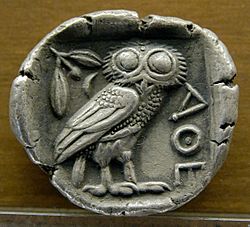Some of what argumentation theorists do is produce a metalanguage of argument. They make up names for stuff. Stuff you shouldn’t do (hollow man) stuff you should sometimes do (iron man). It’s partially a normative study, so the metalanguage is normative. As the Owl of Minerva Problem points out, however, there’s an inherent challenge in that the metalanguage for argument warps our performances. It’s a new thing to keep track of and it alters the way we interact. The thing it was meant to solve isn’t solved. It gets absorbed into the problem it was trying to solve. Interestingly, this is also the case for the Owl of Minerva problem.
Here is a variation on the Owl of Minerva Problem. Recall that the Owl of Minerva is retrospective, and productive of new normative terms. In some cases, once these terms get introduced, they are so powerful that they can never be used. This is to say that once a term becomes associated with a certain kind of extreme failure, it becomes magical. It’s a normative term with actual descriptive power. Take “racism.” Though there are significant disagreements about what really is the issue (ask a philosopher of race), there are no (significant) disagreements that it is bad, very bad. The same is true (with some perverse exceptions) of Nazism). No one wants to be a Nazi, even people who literally hold Nazi views. This video pretty much sums this up:
A more recent version of this featured three police officers caught on tape discussing their desire to engage in racially motivated homicide and start a race war with genocidal objectives. In their own defense, the officers said they weren’t racist:
Later, according to the investigation, Piner told Moore that he feels a civil war is coming and that he is ready. Piner said he was going to buy a new assault rifle, and soon “we are just going to go out and start slaughtering them (expletive)†Blacks. “I can’t wait. God, I can’t wait.†Moore responded that he wouldn’t do that.
Piner then told Moore that he felt a civil war was needed to “wipe them off the (expletive) map. That’ll put them back about four or five generations.†Moore told Piner he was “crazy,†and the recording stopped a short time later.
According to police, the officers admitted it was their voices on the video and didn’t deny any of the content. While the officers denied that they were racists, they blamed their comments on the stress on law enforcement in light of the protests over the death of George Floyd. Floyd, a Black man, died last month after a Minneapolis police officer put his knee on Floyd’s neck for several minutes.
I’d be happy to hear if someone has identified this phenomenon and given it a funny name. It’s something like the Harry Potter Problem, where one invokes fallacy names in place of (hopefully constructive) criticism and discussion. But in this case the invocation of the magic word necessarily backfires. It casts a kind of reverse spell. So one discovers a new powerful and descriptive normative concept, but its very power means its real targets will never accept it.



